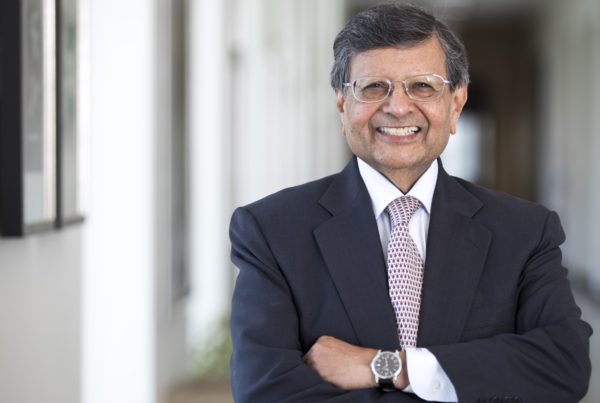Published: Jun 14, 2006 in Knowledge@Emory
Technology today is a constantly moving force. No sooner do we define a concept than it becomes the tool to launch another round of innovation. Our systems and methods are converging at an amazing pace, transforming all patterns of social connection and interaction faster than our world has ever experienced. This living in flux feeds our economy and keeps engineers, scientists, entrepreneurs, writers, and pundits busy. It fuels our dreams of a future that is truly global and truly egalitarian. Yet there is a dark side, with drawbacks ranging from simple confusion to outright addiction and deviancy, says Jagdish Sheth, a chaired professor of marketing at Emory University’s Goizueta Business School.
Sheth’s remarks were among those made by a panel of experts discussing “The Convergence of Technology and Ethics,” as part of Knowledge@Emory’s fifth anniversary celebration. Moderated by Benn Konsynski, a chaired professor of business administration for decision and information analysis at Goizueta, the discussion focused on how the convergence of technologies is changing lives and industries forever. Konsynski opened the panel with the assertion: “Technology changes the art of the possible. For better or worse, society is changed by the widespread adoption of digital technologies. How has digital technology convergence challenged ethical issues in society?”
Technology for the Masses
Technology has never benefited the masses, says Sheth, until the advent of digital technology. “For the first time, you see rewards,” he says. “The content is converging; you take the print media; you take voice communication, television communication, and video—they are all coming together on a single content emergence. You take the cell phone on one hand, the PDA on the other, then the PC, the TV, and even the remote control. They are converging in their functionalities.
“But let me tell you what is really happening,” he continues. “For the first time, we are seeing the benefit of technology for the masses. The world is becoming egalitarian, not as much on the consumption side, but in aspirations. If you go today to the smallest village in India, and you talk to a young boy or girl, and ask who is their hero—it is no longer one of the philosophers, gurus, or teachers. It is Bill Gates. And that kid today can become Bill Gates. Just the determination and the aspiration is going to create that spark, so the world is flat, per Tom Friedman’s book. It is not equal in terms of competition, but equal in the terms of aspirations.”
But there are drawbacks, he allows. “The first major side effect of this technology—it is very addictive,” he says. “It does not mean addiction is universal, but we estimate that about 25% of the people do get addicted. This addiction of the mind, we have no remedies yet. We know how to detoxify the body, but we don’t know how to cure clinical depression, so far, for example.”
“The second effect is deviancy,” he continues. “This technology is so egalitarian that it allows more deviancy. We see more bizarre behavior than ever before. I think personal deviancy is going to rise more and more, especially in societies that are highly individual driven, as opposed to institution driven.”
“The third area is just as important, and that is when artificial becomes real. If I have all the digital content, I can sit in the studio and mix and match all my content. There is no way you can sustain intellectual property rights in the Internet age,” Sheth says. “It is like a great chef, who makes a great meal with a branded salt called Morton’s and a branded sugar called Domino’s. Both of them lose their identity. Branding has no meaning anymore. What I created is my own brand.”
Flattening the World
Throughout history, change was never particularly relevant for the lower strata of society. Examples are numerous. Boris Jerkunica, a serial entrepreneur and 1987 Emory graduate in Math with close ties to Croatia, talks about the recent death of his 102-year-old grandfather in that country. “I went back for his funeral, and my cousins and I were talking about technology and what he lived through in his lifetime. To put things into perspective, when I was eight years old, I would visit the little island he had a house on. There was no electricity; no running water. That was in the 1970s,” Jerkunica adds.
“You can imagine what the world looked like in 1904 Croatia. There has been a huge shift in technology over the last 100 years; and especially over the last 20 years, there has been a bigger shift in Croatia than in the United States. [When he was born] cars were just beginning to come around in the U.S. He didn’t see his first train until he was 14; and when, in 1925, he actually got on an airplane for the first time, they gave him a parachute.”
Multinational corporations are one avenue that is flattening the world. Mark Snyderman, Chief Ethics and Compliance Officer for The Coca-Cola Company, is responsible for moderating the ethical behavior of 50,000 employees in close to 200 companies. “The biggest challenge we face is that there are many different standards of what constitutes proper ethical conduct around the world,” he says. “That is changing. You are seeing standards being raised in terms of public corruption and so forth. Multinationals will go in, and they just won’t play by those [old] rules. You see a lot of behavior changing. And we’re being held to a higher standard, which we should be. I’m charged with trying to make sure that our employees do act in a certain way. Technology has been a tremendous benefit.”
Still, some change merely amplifies the differences. Sarbanes-Oxley orders that U.S. based countries must have a mechanism for people to report misconduct anonymously. “The French don’t like reporting at all,” Snyderman says. “It’s a cultural thing. It goes back to World War II and people reporting each other to the Nazis. They frown on that notion. We tell employees, if you see something improper, you need to report it. In fact, it is a violation of our code if you see something and don’t report it. That provision is unenforceable in France and in a number of European Union countries.”
Politics is yet another roadblock to emerging technologies, as Jeff Levy, chairman and CEO of PurDigital Media and Biltmore Communications discovered when he joined one of the early initiatives to create a municipal wi-fi infrastructure in Atlanta. He’s not optimistic about newer models of wi-fi either, primarily because of the technical limitations. “Wi-fi is like a cordless phone. It extends a wire connection with about the same range as a cordless phone. But it is being deployed now in metro areas like a cell phone, and it doesn’t work that way,” Levy says. “The next generation of wi-fi you will hear about is Wi-Max. It’s a little more like a cell phone, in the amount of area that it covers, but I think we’re soon going to experience the tragedy of the commons. If you have a number of users on it, the bandwidth very quickly fractionalizes.”
On the other hand, Levy believes IPTV is going to change how the world views video content. “More than four million people went to ncaa.com during March Madness just to watch basketball games,” Levy says. “But the television ratings didn’t move at all. It just showed a new way that we could get video information. What’s about to happen is that you will be able to essentially Google your television set and access all of the video information that might be available in this little picture on your PDA screen.”
Self-cannibalism at BellSouth
This is all really cool, even if you are one of the companies watching your branded technology pile up at the side of the road, says Andrea Casson of BellSouth’s Program Management Office for IP Services. “Self-cannibalism is nothing new to BellSouth,” says Casson, a Goizueta alum. “Most recently, we went through it with T1 and DSL. When DSL came out everyone at BellSouth said, ‘What are we going to do? Our lucrative T1 business is just going out the window.’ The world didn’t come to an end. In our industry, we’re used to being in turmoil. We had 50 to 60 years of relative quiet. We started working on convergence really 15 years ago; in earnest five years ago. This is a long overdue welcome change for us because it brings a lot of benefits to use. We will have a much more efficient network that is easier to manage; it ultimately will lower our costs because we’ll have fewer platforms. We’re excited about it.”
Casson reminds the audience of BellSouth’s challenges during the big change from analog to digital. “It was very difficult to get grandma to give up her rotary phone. As the provider of last resort, we have to serve everyone in the Southeast. We can’t just cherry pick what customers we want to serve. We have to figure out a way to bring these 15 million customers, many of whom are not going to want to change over, onto a VoIP platform.”
The world may be well on its way to being flat, but for the immediate future, watch out for those speed bumps.




